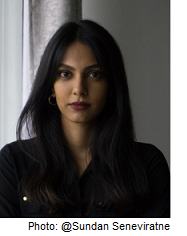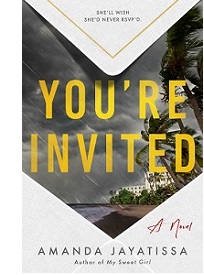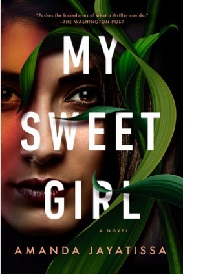Author Amanda Jayatissa’s Thriller Highlights Sri Lanka’s Glitzy Weddings, Society Gossip, Murder
by Debra Lau Whelan
 In Amanda
Jayatissa’s latest mystery, You’re
Invited, L.A.-based Amaya Bloom flies back to Sri
Lanka to stop the wedding of her former-boyfriend to her childhood
bestie. But when the bride-to-be goes missing--and is presumed
dead--all fingers point to the crazy ex, Amaya. Jayatissa’s
sophomore novel weaves a tale of jealousy, dark secrets, and
hidden agendas, leaving readers with a shocking ending.
In Amanda
Jayatissa’s latest mystery, You’re
Invited, L.A.-based Amaya Bloom flies back to Sri
Lanka to stop the wedding of her former-boyfriend to her childhood
bestie. But when the bride-to-be goes missing--and is presumed
dead--all fingers point to the crazy ex, Amaya. Jayatissa’s
sophomore novel weaves a tale of jealousy, dark secrets, and
hidden agendas, leaving readers with a shocking ending.
Raised in Colombo, Jayatissa received her B.A. from California’s
Mills College and co-owns the Brick Lane Cookie Company chain of
stores. Now a full-time writer, her debut novel, My
Sweet Girl, about a young woman’s struggles with her
identity, won the award for Best
First Novel at ThrillerFest
2022.
We spoke to Jayatissa about high society Sri Lankans, the
country’s ongoing political crisis, and why she never thought
she’d become a writer.
I learned so much about Sri
Lanka from your book, including that there’s another group of
“Crazy Rich Asians.”
You’re
Invited is a very interesting little subsect of
Colombo society. Much less than one percent of the country behaves
that way. I wanted to write about Sri Lanka because you don't see
very much of it in the media except for terrible things like war,
ethnic conflicts, or the economic crisis. That’s the way Sri
Lanka's usually framed, especially in Western media, and in my
writing I try to bring in other elements that not many people get
to see.
What subsect of Sri Lankan society are you from?
There’s wealthy, and then you get the super wealthy that operate
on a completely different level. My parents are definitely not
super upper class, but we had a privileged, comfortable
upbringing. I was lucky they really valued that my brother and I
got a good education, so we went to the best schools in Colombo.
When you go to the best schools, most of your classmates are from
this one percent.
How stark is the rich/poor divide there?
We’re constantly faced with this strong contrast between the very
wealthy and those who aren’t. Those disparities only widen with
the economic conflict. It’s very normal to walk down the street
and see mansions on one side and little huts with people living in
absolute poverty on the other.
Is it more obvious in Colombo?
Colombo is like a bubble compared to the rest of the country
because it's a major city, and the problems and the conflicts that
people face here are so different from people in more rural areas.
A few years ago, the women in Colombo talked about sexism in the
workplace, which is absolutely valid. But women from the villages
would say, “Street harassment? We're trying to feed our babies,
and we don't have access to clean water, food, or formula.”
 How
did you come up with the idea for You’re
Invited?
How
did you come up with the idea for You’re
Invited?
I was people watching at one of these beautiful weddings, and I
noticed this look on the groom’s mother’s face. I didn’t know why
she was upset, but it was just this split second of a fluttering
on her face. Then my imagination started running wild, and I
thought, “Wouldn't this be a fun place to set a murder
mystery/thriller? And wouldn't it be fun to introduce a dead body?
Weddings are a big deal in Sri Lanka.
Sri Lankan weddings are grand affairs regardless of what
socioeconomic group you are from. People are toning it down a
little bit after COVID, but they will take out loans, mortgage
their houses, or sell their land. They might not spend as much on
their daughter's education, but they will spend it on a wedding.
If certain ceremonial events don’t happen, it's seen as some sort
of shortcoming. The bride has a grand affair, which is the
wedding, and the groom has an equally grand affair, which is the
homecoming. It’s like two weddings, and they try to outshine each
other.
I see that not being invited to a wedding is a big no-no,
too.
It's enough for families to stop speaking to each other. Slights,
whether real or imagined, are very dangerous. My husband and I
wanted a small wedding, but we had 90 people in our immediate
families. When you start cutting down numbers, it’s considered a
huge insult. These are things that people see as unforgivable, and
not inviting someone to a wedding tends to be one of them.
The book starts out giving us the impression that the
main character, Amaya, is crazy. But is she?
It's very easy for us as a society to jump to the conclusion that
a woman is unhinged or jealous. I really wanted to flip that
narrative a little bit.
I liked that you emphasized the sadness that comes with
the breakup of female friendships.
It's happened to many women, but it's something that's not talked
about enough. I have friends who I miss, and you're not in a
position where you can message them because too much time has
passed. Sometimes you don't even know why you're not friends
anymore. I definitely have a few friends whom I don't speak to
anymore and miss very much.
It surprised me when you introduced the subject of a
crime that’s so taboo.
It is something that is not talked about enough in all societies,
not just here. I don't want to reveal too much of the story, but
it was necessary in shaping that specific character and discussing
why that particular character was so dangerous.
Why is Amaya obsessed with numbers and checking the
clock?
When I wrote Amaya, it was during the height of COVID lockdown,
and I was dealing with a lot of my own anxiety. So that definitely
led its way into Amaya’s character. A lot of her character is
based on this relationship she has with control over her life.
With numbers, she has this external focus of control; a coping
mechanism that a lot of people with anxiety tend to have.
Is any part of You’re Invited autobiographical?
Almost all the rumors in the book are actual rumors. I had fun
doing research for the book and trying to come up with little
juicy bits that I had forgotten. I called one cousin who had two
friends who were very keyed into everything, and I asked them to
tell me the juiciest stories. They were all like, “Did you hear
the story about this guy who allegedly filled his bathtub with
Moet?” There are always rumors of somebody's pregnant, someone is
cheating on his wife or husband, or whether someone is gay. A lot
of the time they're based on gossiping aunties and the rumors have
a terrible impact on marriages, friendships, and relationships.
Your book even says that marrying a Sudha, or
white man, is fodder for gossip.
Sri Lanka is a post-colonial country and we have this very
interesting relationship with Western culture. We fall into
largely two groups: one group that thinks you should aspire to
marry a white man, and you should speak the Queen's English. That
group reveres the West. And then you get the group of people who
say, “This is our country. This is our culture. We’re a
postcolonial country, and our culture was ruined by the West.”
There was a huge Twitter debate in Colombo between those mourning
the Queen's death and those who were absolutely enraged.
And that having a Western accent could work against you.
Can you explain?
Until two generations ago, our country spoke in English. Then
suddenly, in [1956] the government passed the Sinhala Only Act,
making Sinhalese the official Sri Lankan language. This sparked
massive ethnic conflict that set off years of violence between the
Tamils and Sinhalese. It was the darkest period of our country.
Along with that came a shift to nationalism and anti-Western
attitudes that were tied into why we need to speak English. Or why
would someone put on an accent. I did corporate training on
communication skills development and one of the things that I kept
trying to explain to people was that accents are not a good thing
or a bad thing. It's just a thing. If you watch a lot of American
TV, there's a good chance you're going to have an American accent.
What was it like growing up during the civil war?
The Sri
Lankan Civil War was between 1983 and 2009, so we all grew
up hearing bombs go off. We in Colombo didn’t suffer as much as
the Sri Lankans living in the north and northeastern parts of the
country.
How has the economic crisis and recent anti-government
protests affected you?
We’re right in the middle of a huge political crisis. There were a lot
of protests and for the first time, everyone was unified by the
fact that we were all very unhappy. This general sense of
unhappiness brought everybody together. It was the first time that
I saw a lot of the one percenters at the protests.
 This is
your second book after My Sweet Girl. Are you a
celebrity at home now?
This is
your second book after My Sweet Girl. Are you a
celebrity at home now?
There's not too much of a celebrity culture here because we're
such a small society. It’s very incestuous, and there’s one degree
of separation. I was in New York for ThrillerFest and one writer
came up to me and said she knew another writer from Sri Lanka. And
I knew that person. Very rarely, someone will say, “Hey, you're
the author, and I want to know everything about writing.” I love
it, especially when younger kids come up to me and say they want
to be writers.
How seriously do you take that role?
I take it very seriously because we have very limited access to
information here. It’s changing with the internet, but for the
longest time, we didn't get any new books. Hardcover books are
really expensive. And writing groups and critique groups don't
really exist here. When I got my publishing deal, I was very vocal
that if anyone was interested to please reach out to me. A few
people did, and a couple of them now have publishing deals. Now
they're going out and they're helping other Sri Lankan writers.
Walk us through your creative process after you have an
idea.
I usually get a little snippet of an idea at an inopportune time,
like when I'm in the middle of working on something else, and I'll
write it down. It will stay there in my mind and percolate for a
couple of months. I'm also really bad at juggling different
projects, so I have to finish one before I start something new. So
when I was at this wedding, I was writing “My Sweet Girl.” I
emailed my agent to ask, “What do you think about a thriller sent
at a Sri Lankan wedding?” She said she loved it.
How long does it take you to write a book?
When I write my first draft, nobody hears from me, and I go into
my writing hole. I don't leave the house because I have to get
that first draft out. It’s usually really bad. But I get that
whole A to Z plot down on paper so I can start to edit. I write as
hard as I can and as fast as I can for about two to three months.
Then afterwards, I sit on it a little before I go back and edit it
in a more disciplined way.
What’s your writing process like?
I have a very brief outline; almost like a beat sheet. Then I set
that aside, and I take a couple of weeks to get into the head of
my main character because I like to write in the first person. I
journaled in Amaya’s voice, writing down her insecurities, what
she was willing to do to get what she wanted. After that, I really
felt that I had a handle on her voice, and I started writing.
What did you study in school?
International relations with a minor in sociology. I was a really
nerdy, Model UN kid. I thought I wanted to go into diplomacy. But
out of college, nothing made me happy, and then I got married. My
husband and I set up multiple businesses and all of that is going
well, which has been great because it's given me the freedom to
write.
You were a corporate trainer and you have a cookie
company. Do you write full time now?
I'm writing full time now and a fantastic staff runs the cookie
shops. COVID put a stop to the corporate training, and the writing
thing took off. My husband runs a travel company that we started
as soon as we got married.
You grew up in Colombo. What made you leave for college
in the U.S.?
I studied Sinhalese, and then I switched to an international
school system. I always knew that I wanted to leave at some point
just to see the world. A lot of my friends were going to the UK,
so I decided to go to California. I went to Mills College, a small
liberal arts women’s college in the Bay area and absolutely loved
it. Then my mom got sick with breast cancer, so I moved back. I'm
really glad I did because she passed away within the year, and I
got to spend time with her.
Did you ever think you’d become a novelist?
I never studied creative writing. It was something that I always
wanted to do, but never had the opportunity to do. When you grow
up in a place like Sri Lanka, it was frowned upon that I would
pursue anything even remotely creative. We were expected to study
something that you could make a career out of, and do your
creative things on the side.
I never thought I would write as a career. I self-published
something just before my 30th birthday to see if I could make a go
of it and it won an award, which gave me a little bit of
confidence. This is what I really love doing and, for the first
time, I'm really, really happy.
